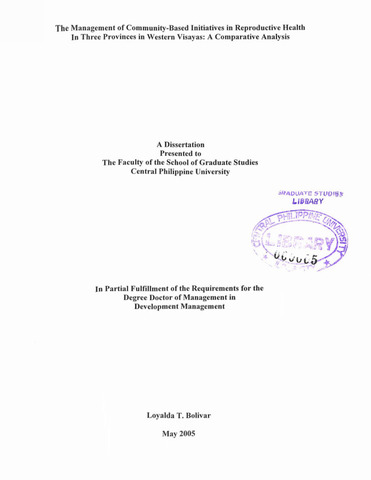The roles of public health workers in the promotion and implementation of mass drug administration against Filariasis in the Province of Antique: Knowledge, attitude and adherence
| dc.contributor.adviser | Yoro, Carolyn L. | |
| dc.contributor.author | Alabado, Ryan R. | |
| dc.date.accessioned | 2021-02-12T03:07:56Z | |
| dc.date.available | 2021-02-12T03:07:56Z | |
| dc.date.issued | 2014 | |
| dc.identifier.citation | Alabado, R. R. (2014). The roles of public health workers in the promotion and implementation of mass drug administration against Filariasis in the Province of Antique: Knowledge, attitude and adherence (Unpublished Master's thesis). Central Philippine University, Jaro, Iloilo City. | en_US |
| dc.identifier.uri | https://hdl.handle.net/20.500.12852/326 | |
| dc.description | Abstract only | en_US |
| dc.description.abstract | This study was conducted to determine the public health workers’ (PHWs) knowledge about their roles, attitude towards their roles and adherence to the promotion and implementation of mass drug administration (MDA) against filariasis in the province of Antique. Furthermore, this study aimed to determine the relationship between the PHWs’ personal characteristics such as age, civil status, type of health worker and length of service, their knowledge about their roles, attitude towards their roles, and adherence to the promotion and implementation of MDA against filariasis. This descriptive relational study used the one-shot survey design. Data were collected from a sample of 263 public health workers in the province of Antique using a researcher-made self-administered questionnaire, which had been validated and pilot-tested. Ethical considerations were observed and maintained during the data gathering. The findings revealed that the PHWs in the province of Antique were mainly 40 to 59 years old, married, barangay health workers (BHWs) who were just new to the government service, serving for less than 5 years. They had “high” level of knowledge about their own roles in the promotion and implementation of MDA against filariasis. However, most of them did not have an idea on the roles of their fellow health workers. Comparatively, there were higher proportions of public health nurse (PHN) than rural health midwife (RHM) and BHW respondents who knew most of their own respective roles in the promotion and implementation of MDA against filariasis. However, there were greater proportions of RHM and BHW than PHN respondents who had identified the roles of their fellow health workers as part of their own roles. In terms of attitude, the PHWs in the province of Antique had “fairly favorable” attitude towards their roles in the promotion and implementation of MDA against filariasis. Furthermore, PHWs had “high” adherence to their own roles in the promotion and implementation of MDA against filariasis. However, most of them also performed the roles of their fellow health workers. Only a small proportion of them were not participating in the MDA against filariasis and they were all BHWs. Comparatively, there were greater proportions of PHN than BHW and RHM respondents who adhered to most of their own roles in the promotion and implementation of MDA against filariasis. Likewise, there were greater proportions of PHN than BHW and RHM respondents who performed most of the roles of their fellow health workers in the promotion and implementation of MDA against filariasis. The results of relational analysis showed that the PHW’s civil status and type of health worker have no significant bearing on their level of knowledge about their own roles and their adherence to their own roles in the promotion and implementation of MDA against filariasis. The PHW’s age and length of service affect their level of knowledge about their own roles, but do not affect their adherence to their own roles in the promotion and implementation of MDA against filariasis. The PHW’s attitude towards their roles is dependent on their type of health worker and length of service, but not on their age and civil status. The PHW’s level of knowledge about their own roles is not related to their attitude towards their roles. The PHW’s attitude towards their roles and adherence to their own roles in the promotion and implementation of MDA against filariasis are likewise not related to each other. Moreover, the PHW’s level of knowledge about their own roles is not associated with their adherence to their own roles in the promotion and implementation of MDA against filariasis. This association still exists and remains the same even when attitude towards their roles is controlled. | en_US |
| dc.format.extent | xiv, 131 leaves | en_US |
| dc.language.iso | en | en_US |
| dc.subject.lcc | GSL Theses 610.73072 Al11 | en_US |
| dc.subject.lcsh | Public health advisory groups--Antique | en_US |
| dc.subject.lcsh | Public health personnel--Antique | en_US |
| dc.subject.lcsh | Public health | en_US |
| dc.subject.lcsh | Communication in public health | en_US |
| dc.subject.lcsh | Filariasis--Antique | en_US |
| dc.subject.lcsh | Drugs--Administration | en_US |
| dc.subject.mesh | Filariasis | en |
| dc.title | The roles of public health workers in the promotion and implementation of mass drug administration against Filariasis in the Province of Antique: Knowledge, attitude and adherence | en_US |
| dc.type | Thesis | en_US |
| dc.description.bibliographicalreferences | Includes bibliographical references | en_US |
| dc.contributor.chair | Somo, Lily Lynn V. | |
| dc.contributor.committeemember | David, Fely P. | |
| dc.contributor.committeemember | Delicana, Lilia A. | |
| dc.contributor.committeemember | Calibjo, Mylene S. | |
| dc.contributor.department | School of Graduate Studies | en_US |
| dc.description.degree | Master of Arts in Nursing | en_US |
| local.subject | Filariasis--Drugs--Administration | en_US |





